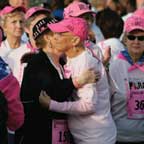Women Helping Women

It’s time once again for “the big race.” I’m speaking, of course, about the Race for the Cure May 13. This race takes place every year on Mother’s Day weekend, and proceeds are donated to fund breast cancer research. We all dream of the day when we no longer have to run for the cure because the cure will be available—instead of a distant hope.
The exact cause of breast cancer hasn’t been determined. The biggest risk is being a woman. Breast cancer is the most common non-skin cancer diagnosis among women in the United States and the second leading cancer cause of death after lung cancer. One in seven women will develop breast cancer in her lifetime. The risk of breast cancer increases with age; 77 percent of women diagnosed are 50 and older. Some women feel breast cancer is particularly threatening for a woman’s self-esteem and body image because it concerns a part of the female body directly linked to femininity and sexuality.
Contrary to popular belief, most cases of breast cancer occur in women with no previous personal or family history of cancer. Seventy-five to 80 percent of breast cancers aren’t inherited. The majority of breast cancers are ductal cancers. However, more noninvasive cancers and smaller invasive cancers are being diagnosed. This is due to early detection through improvement of diagnostic tools.
Only 5 to 10 percent of breast cancers are related to mutated breast cancer genes (BRCA1 or BRCA2). An important feature of the increased incidence of breast cancer associated with BRCA mutations is the high incidence of breast cancer at an early age. In a woman with a BRCA mutation, the risk of breast cancer can be as high as 50 percent, whereas it’s approximately 2 percent in the general population. BRCA mutation carriers face a lifetime risk for breast cancer of 65 to 80 percent. However, this doesn’t mean there isn’t hope; technology is getting better and better.
There are several major risk factors for breast cancer:
• Personal history of breast cancer. This increases a woman’s risk of developing a new cancer by three to four times that of a woman who hasn’t had breast cancer.
• Family history of breast cancer. Ten to 20 percent of women with breast cancer have a family member with breast cancer.
• Inherited risk (genetic mutations (BRCA1 and BRCA2).
There are also minor risks for breast cancer:
• Early menarche (before age 12).
• Late menopause (after age 55).
• Having had no pregnancies.
• First pregnancy after age 30.
OSF Saint Francis Medical Center offers the Centers for Breast Health, which serve more than 30 mostly rural counties in central Illinois. In 2005, the center received a national award because of the unique way it cares for women who’ve been diagnosed with breast cancer. The Centers are becoming nationally known.
There are so many ways women can help other women work toward decreasing their risk of breast cancer, such as eating healthy, increasing fiber, exercising, relieving stress, etc. There’s new information out about how carrying excess weight through the pre- and post-menopausal years may be linked to the risk of post-menopausal breast cancer. Recent observational data suggest weight loss reduces risk and may make weight loss a potential strategy for breast cancer prevention. Long-term studies in humans, of course, are necessary to determine if this is really true. This year, use the “women helping women” theme and do something different for breast cancer risk reduction: join a yoga class, do Tai Chi, or walk with a friend. By all means, have your mammograms and participate in Race for the Cure.
The week of Mother’s Day, free hand massages will be offered at the OSF Saint Francis Center for Health during certain times in honor of all the grandmothers, mothers, sisters, aunts, and daughters who’ve died from breast cancer. If it’s time for your mammogram, come to the Center for Health and take part in this special way of honoring the most precious women in your life.
Take your mother, your sister, or a friend to the Race for the Cure. Better yet, walk or run in it. Early detection of breast cancer is a great cause we need to support. TPW
